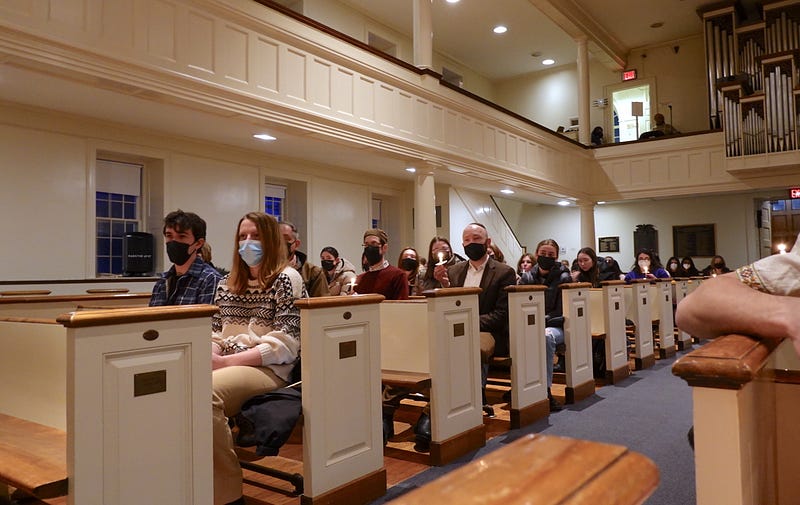
On Thursday, March 3, members of the Hamilton community gathered for the “Candles for Ukraine” vigil to demonstrate support for those affected by the Russian invasion. The event was organized by the Hamilton College Young Democratic Socialists of America (YDSA), with Matt Surprenant ’23 and Gabriel Bit-Babik ’25 leading the process.
Student speakers included Surprenant, Bit-Babik, Sarah Sandison ’23, Kateryna Tsaryova ’23 and Vesa Miftari ’24. Faith speakers Imam Thomas Facchine and Rabbi Ethan Bair shared prayers and words of support for the people of Ukraine. From the Hamilton faculty, Assistant Professor of Russian Languages and Literatures Jason Cieply also delivered a speech.
Students spoke about a variety of topics, from their own experiences with Ukrainian residents to their views on student activism on campus. Tsaryova in particular focused on activism towards Ukraine, questioning, “Where is the intent? What is the intent?” The speech urged students to consider the objective of their activism. Tsaryova argued that a hashtag, slogan or Instagram story is not enough, and that those wanting to show support must be authentic and take concrete action.
Towards the end of the vigil, each attendee lit their candle and took part in a moment of silence. Speakers asked those attending to take the time to reflect on the events happening in Ukraine and ways to stand in solidarity with the victims of the war.
“Everyone has seen the event and the tangible donations gathered during it as Hamilton adding their voice to a growing call for peace. We’re all living and studying here on a hill where at times it’s easy to disconnect from the issues abroad. We’re a country that hasn’t had a war fought on its soil in over a century, and so I think we’ve all become somewhat comfortable in going to sleep at night not thinking of the millions of human lives thrown into havoc by war. The powerful few declare it, and the peaceful many are forced to die in it. Not just in Ukraine, but also in Syria, Myanmar, Yemen and tragically elsewhere,” said a representative from YDSA.
The vigil ended with the opportunity to donate to various organizations such as the Ukrainian Red Cross, Fight for Right, Voices of Children and Libereco through cash boxes and HillCard readers. The donations raised at the vigil totalled over $341. An open discussion regarding the events in Ukraine with Professor Cieply also followed the event.
“In many ways, this [vigil] does not feel like enough,” said the YDSA email containing a community-wide invitation to the vigil.
“I think that we must first acknowledge what we students can do and come to grips with what we can’t. We don’t have the resources individually to send something like an airlift of humanitarian aid from Clinton to Kyiv but at YDSA, we stress the power of collective organizing. Making a combined effort to help donate, campaign for and otherwise assist with pressing issues such as how to help the growing Ukrainian refugee population would be an excellent start,” said the YDSA representative.
Much of the support on campus has come from student led clubs, with the College Democrats, International Cultural Association, Disabled Students Network and Center for Intersectional Feminism all supporting the organization of the “Candles for Ukraine” vigil.
“There’s a real hunger on this campus to have student engagement and activism,” said Bit-Babik, noting the high turnout at the “Let’s Talk About the Letter” event held Friday, March 4. Bit-Babik also spoke about the future of student activism on campus, emphasizing that the main problem he has encountered from upperclassmen has been burn-out from the pressure of activist responsibilities. As a first year, he wants to be able to “continue to evolve and push to the end without burning out.”
When asked if the Hamilton administration could be doing more to support Ukraine, Bit-Babik was concerned that the administration “uses us as a way to show that Hamilton is doing something for Ukraine. They use our efforts and work without doing something themselves.” He has noticed that the history of activism on campus has often led to the institutional issue of administration co-opting the efforts of student activists. Bit-Babik believes “if we really want to make a difference, whether it be for Ukraine or otherwise, student-led efforts have to be supported by the administration,” and this support includes lasting active dialogue surrounding these issues.
In an email sent to the Hamilton community, President David Wippman condemned the actions of the Russian government, writing, “Russia’s invasion of Ukraine represents one of the most flagrant breaches of the fundamental norms governing the international order since the United Nations Charter was signed in 1945, and it has created a humanitarian and geopolitical crisis that is just beginning.” He concludes with offering “sympathy and support to those students, alumni, parents, faculty, and staff who have family or friends in Ukraine or are otherwise directly affected.”
Hamilton-sponsored events on the Russia-Ukraine crisis have primarily focused on spreading awareness and education.
On Friday, March 4, the Levitt Center held “Crisis in Ukraine,” a panel discussion featuring Sol M. Linowitz Visiting Professor of International Affairs Robin Quinville, Henry Platt Bristol Professor of International Relations Alan Cafruny and Professor of Government Sharon Rivera. Furthermore, an alumni organized event, “Crisis in Ukraine: Causes and Consequences,” featured a virtual series addressing the causes and implications of the Russia-Ukraine crisis.
















